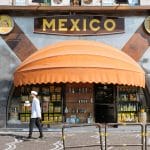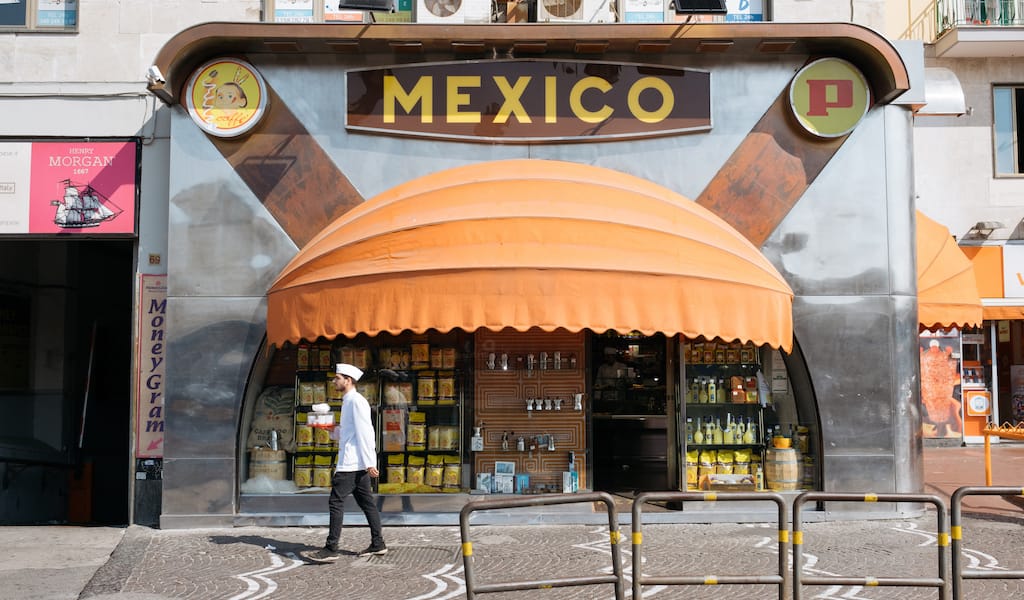When ordering a café in Marseille, keep your eye out for sugar packets and espresso cups lined in yellow and white. These diagonal stripes are the sign of Café Luciani, a logo inspired by the red and white panels on truck tailgates. Yet while those stripes implore you to be careful and hang back, Luciani encourages the opposite – they want you to dive head first into your cup of coffee.
The father-and-son coffee company began in 1863 as the Phocéenne de Torréfaction (the Phocaean Coffee Roaster), named after the lineage of the sailor who founded Marseille. Pascal Escudier’s locally roasted coffee was reputed for its “exquisite aromas” in an era when the petit noir was more about consumption than the quality of its composition.

Marseille brimmed with over 80 roasters before the Second World War, its busy port welcoming ships laden with green beans from Africa and South America. The Phocéenne de Torréfaction was one of the few to survive the war, remaining strong in its original locale in the St. Just neighborhood. In 1965, the Escudier family sold the roastery to the late Pierre Luciani, a café aficionado whose coffee interest had percolated while working for the espresso machine company Conti.
André, his son, had a childhood steeped in coffee. Dreaming of the far-off lands from which the beans came, he naturally joined the family business in 1978 post-graduation. Recognizing the trend towards craft coffee in the late 2000s, André sought out fair trade and organic farms, revamped the marketing to focus on the company’s heritage, and even started to make capsules to please France’s Nespresso addicts. His infectious enthusiasm and impressive know-has built the brand into a Marseille name.
While Luciani is a Corsican name, a nod to Marseille’s large community from the French island across the Mediterranean, the company’s spirit is heavily Italian. André zips around town on a Vespa to visit clients. He thinks a cuccumella, the flip-pot Neapolitan coffee maker, is, hands-down, the best way to brew coffee at home. And for businesses, he sings Faema’s praises (“La Marzocco is overpriced s$#t”), particularly the Faema 61 that he sells to local cafés. Like his dad, André can fix any espresso machine – as witnessed by the jumble of tools, machines and parts that fill his workshop.

At Café Luciani’s small warehouse, burlap sacks of green beans from Columbia to Ethiopia are stacked beside the roaster. Though André currently is gaga for a Guatemalan robusta – a type that is usually grown in Africa – he fervently believes that “the best coffee is one that you love.” Hence his willingness to tailor special blends for his clients, like Coogee, the Aussie-style coffee shop near Castellane that is beloved by java junkies.
In tune with Café Luciani’s core value – produce less to produce better – they roast the day that they ship the beans to ensure the freshest aromas and flavors are sealed in the bags. Like a chef’s love for his cast iron pans, André swears by his old-school iron Italian roaster. At 45 rotations a minute, it takes around 15 minutes to torréfier, an art that André and his full-time roaster practice by ear, eye, nose and decades of doing.
[The beans] are done when they “smell like deliciously toasted bread” and are the “color of a monk’s robe.”
When the beans start to crackle like a bowl of Rice Krispies in milk, they’re almost ready. At this point, André repeatedly pulls out the machine’s small tester scoop to check the beans – they’re done when they “smell like deliciously toasted bread” and are the “color of a monk’s robe.” To best verify the color, “you need to look at the beans in natural light,” explains André, bringing a scoop outside, away from the fluorescent bulbs inside.

Once they’re ready, he quickly turns a wheel to release a cascade of beautifully browned beans into a giant, cylindrical drum. A rotating fan cools them down before they tumble into a machine that removes the chaffs – the bean’s outer layer that slips off during the roasting process. Voila, the beans are ready to be packaged.
The roasting isn’t technically open to the public, but you can get in on the action when picking up beans from Café Luciani’s on-site shop. For this fragrant field trip, take the metro or bus to the non-touristy quartier of St. Just. Or find the beans bagged or brewed at cafés, shops and restaurants across town (like Maison Empereur and Blackbird Coffee) that André’s son, Jean-Baptiste, sells to. You’ll also see the two Lucianis preaching the gospel of good coffee at local events. Just keep an eye out for that yellow stripe.
 February 21, 2020 Café de la Banque
February 21, 2020 Café de la Banque
Some of Marseille’s most majestic buildings surround the Estrangin métro stop: the […] Posted in Marseille August 22, 2022 Caffè Mexico
August 22, 2022 Caffè Mexico
Some people believe that a cup of coffee is the same everywhere. We like to think that […] Posted in Naples June 20, 2019 Flor da Selva
June 20, 2019 Flor da Selva
Walk through Lisbon’s Madragoa, a neighborhood of cobblestoned streets and small houses, […] Posted in Lisbon
Published on December 10, 2019
Related stories
February 21, 2020
MarseilleSome of Marseille’s most majestic buildings surround the Estrangin métro stop: the American consulate, the ornately sculpted Caisse d’Epargne bank, and the Napoleon-style Préfecture. Between them sits an equally iconic institution, Café de la Banque. Yet while its high-profile neighbors deal in banking and bureaucracy, this spot serves something more essential: a dependable place for…
August 22, 2022
NaplesSome people believe that a cup of coffee is the same everywhere. We like to think that they haven’t been to one of the Mexico cafés in Naples, where even a coffee novice can understand he has come face-to-face with a very special brew, one that took years to perfect. When you enter a Caffè…
June 20, 2019
LisbonWalk through Lisbon’s Madragoa, a neighborhood of cobblestoned streets and small houses, and you'll be hit with the intoxicating smell of freshly roasted coffee. Follow the scent and you are likely to find yourself in an utterly unique spot: Flor da Selva, one of the last wood-fired coffee roasters in Europe. Manuel Alves Monteiro, from…




















































































